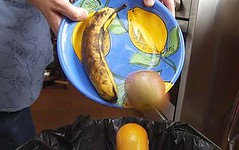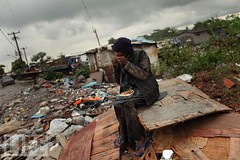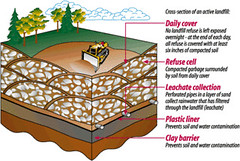Many people think of food waste as a benign substance. It rots down in the landfill anyway, so no problem, right?
Wrong! For food to compost properly, it needs light and air. In the landfill, it has neither.
Instead, food devoid of light and air produces methane gas, which contributes to global warming. It is estimated that we throw away a third of the food we buy each week! Through poor portion control or buying too much fresh food that goes off before we use it we create a lot of waste.
Follow these tips to help you reduce food waste, save money and protect the environment:
1. Write a list!
Menu plan your meals for a week. Check the ingredients in your fridge and cupboards, then write a shopping list for just the extras you need.
2. Stick to the list!
Take your list with you and stick to it when you’re in the store. Don’t be tempted by offers and don’t shop when you’re hungry — you’ll come back with more than you need.
3. Keep a healthy fridge.
Check that the seals on your fridge are good and check the fridge temperature too. Food needs to be stored between 1 and 5 degrees Celsius for maximum freshness and longevity.
4. Don’t throw it away!
Fruit that is just going soft can be made into smoothies or fruit pies. Vegetables that are starting to wilt can be made into soup.
5. Use up your leftovers.
Instead of scraping leftovers into the bin, why not use them for tomorrow’s ingredients? A tablespoon of cooked vegetables can be the base for a crock pot meal.
6. Rotate.
When you buy new food from the store, bring all the older items in your cupboards and fridge to the front. Put the new food towards the back and you run less risk of finding something moldy at the back of your food stores!
7. Serve small amounts.
Serve small amounts of food with the understanding that everybody can come back for more once they’ve cleared their plate. This is especially helpful for children, who rarely estimate how much they can eat at once. Any leftovers can be cooled, stored in the fridge and used another day.
8. Buy what you need.
Buy loose fruits and vegetables instead of prepacked, then you can buy exactly the amount you need. Choose cheese from a deli so that you can buy what you want.
9. Freeze!
If you only eat a small amount of bread, then freeze it when you get home and take out a few slices a couple of hours before you need them. Likewise, batch cook foods so that you have meals ready for those evenings when you are too tired to cook.
10. Turn it into garden food.
Some food waste is unavoidable, so why not set up a compost bin for fruit and vegetable peelings? In a few months you will end up with rich, valuable compost for your plants. If you have cooked food waste, then a kitchen composter (bokashi bin) will do the trick. Just feed it with your scraps (you can even put fish and meat in it), sprinkle over a layer of special microbes and leave to ferment. The resulting product can be used on houseplants and in the garden.
With thanks to Atul Bafna
Other articles about food waste:
People are needlessly throwing away 3.6m tonnes of food each year in England and Wales…
Councils are to start collecting food waste separately in order to tackle climate change.
London receives £362,000 grant to save food from landfill.







